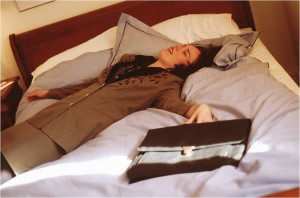“Sleep that knits up the ravel’d sleeve of care,
The death of each day’s life, sore labor’s bath,
Balm of hurt minds, great nature’s second course,
Chief nourisher in life’s feast…” — William Shakespeare, Macbeth, Act II, Scene II“Sleep is the best meditation.” — The Dalai Lama.
“It is a common experience that a problem difficult at night is resolved in the morning after the committee of sleep has worked on it.” — John Steinbeck, American writer.
 Do you get enough sleep at night?
Do you get enough sleep at night?
At first glance, you may wonder what this question has to do with personal productivity. But think back to the last time you missed a significant amount of sleep. How did you feel the next day? Were you able to get your work done efficiently and professionally?
Probably not. I’ll bet you felt tense, irritable, red-eyed, edgy, and drowsy—in other words, TIRED. Insufficient sleep can also leave you moody, lethargic, and unmotivated, damage your creativity and problem-solving skills, and make it difficult for you to make decisions and deal with stress. In other words, it works against workplace productivity from all directions.
In terms of physical and mental disorientation, too little sleep can affect you as badly as getting drunk. It should come as no surprise to learn that drowsiness also makes you accident-prone. This can prove deadly if you’re operating heavy machinery or driving a car. According to the National Traffic Safety Administration, driver fatigue causes 100,000 car accidents a year and as many as 1,500 deaths.
The Golden Mean
The standard required-sleep estimate for working-age adults comes to eight hours—a decent compromise between the 7.5-9 hours most experts cite as ideal. And yet American workers get an average of only six hours and forty minutes of sleep per night. We know better, so why do we do it?
Sometimes you have no choice: something comes up that steals part of your sleep time, or your mind stubbornly refuses to shut down. Generally, though, when and how long we sleep remains up to us. Unfortunately, we sometimes look at our busy day and the big chunk sleep takes out of it, and we decide we can afford to cut back. That’s a mistake, because we all know the annoyingly unproductive results. Even when you feel fine, your judgment, memory, and decision-making skills suffer. Keep it up and you’ll accumulate a sleep debt you’ll eventually have to make up before you can function in tip-top shape again.
Since most of us know this, we often sleep in on the weekends to try to catch up on our sleep. Whether this works or not depends upon the size of your sleep debt; a few extra hours may help you recover or it may not. If you’ve managed to nap during the day during the week (hopefully not at your desk), then you may be fine.
On the other hand, sleeping too long can also hinder your productivity. Sleep comes naturally in 90-minute rhythms—one reason 7.5 to 9 hours works well for most of us. At the end of the 90 minutes you hit your point of shallowest sleep, where it’s easiest to break through to consciousness. If something has ever woken you from a truly deep sleep, you know how hard it is to shake off your grogginess afterward. So if you set your clock to wake you up in the middle of a sleep cycle rather than at the end, you just might end up less alert than normal even though you otherwise got enough sleep.
The Perfect Sleep
Don’t assume the classic eight-hour figure is set in stone. Some of us need less or more. About 3% of us possess a gene that lets us get by on six hours per night, and for a rare few three hours is enough. On the other hand, some people feel lousy if they sleep less than 12 hours—something almost impossible to achieve in today’s world.
To determine how much sleep you need requires some experimentation. If possible, set aside a “sleep vacation” when you can sleep as long as necessary without resorting to an alarm clock. Just go to bed at a specific time and sleep until you wake up naturally. When you do, get up right away; don’t linger in bed doing anything, even reading. You may need a few days to catch up on your sleep debt, but within a week or so you ought to have hit on your naturally programmed sleep period. From then on just plan for that amount of sleep every night—including on weekends.
If you don’t have time for a sleep vacation and have to rise at a specific time each day, then try going to bed earlier or later and see how you feel the next day. Keep a sleep diary of your responses to various bedtimes. Within a few weeks, you’ll see a pattern emerge that will help you identify the best period for you. Thereafter your biggest challenge will be to stick with the program without letting that “laissez faire” attitude about sleep raise its ugly head again.
Caveat Emptor
All this assumes, of course, you don’t suffer from a sleep disorder. If you require sleeping pills just to get to sleep, or can’t seem to get enough restorative sleep no matter what you do, then you’ll have to consult your doctor in attempt to identify and treat the disorder. Until then, this type of experimentation probably won’t work for you.


